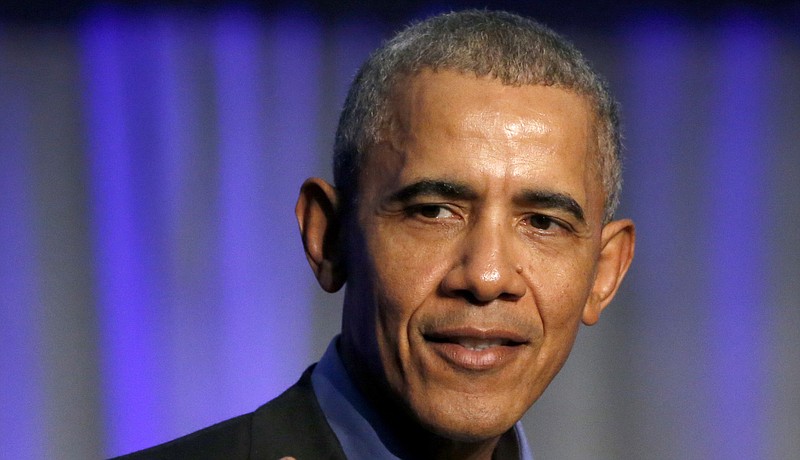WASHINGTON - President Barack Obama separated parents from their children at the border.
Obama prosecuted mothers for coming to the United States illegally. He fast tracked deportations. And yes, he housed unaccompanied children in tent cities.
For much of the country - and President Donald Trump - the prevailing belief is that Obama was the president who went easier on immigrants.
Neither Obama nor Democrats created Trump's zero-tolerance policy, which calls for every illegal border crosser to be prosecuted and leads to their children being detained in separate facilities before being shipped to a shelter and eventually a sponsor family.
But Obama's policy helped create the road map of enforcement that Trump has been following - and building on.
"It's been going on for many, many decades and many years," Trump said this week. "Whether it was President Bush, President Obama, President Clinton - same policies. They can't get them changed because both sides are always fighting. This is maybe a great chance to have a change."
Trump has made tough immigration policy a forefront of his presidency. He wants to build a wall on the southern border. He is trying to impose a ban on travel to and from several majority-Muslim countries. He has targeted sanctuary cities that protect immigrants who are in the country illegally. And he began enforcing the new zero-tolerance policy.
He took it even further by separating more than 2,000 children from their parents as a way to deter future migration, which has caused national bipartisan outrage. On Wednesday, he signed an executive order designed to end the family separations, but children would still be detained with their parents.
Obama took several actions that led to an outcry of fear and distrust, though his actions failed to get the attention the Trump administration has.
The White House declined to comment on specific actions of previous presidents. But a DHS official said it's frustrating to be blamed for conditions at facilities that predate Trump and for creating new policies that were already in action.
"We're enforcing the rule of the law," said the DHS official, who is not authorized to speak publicly. "This is something that the previous administration didn't do. The decades of ignoring this is what has led to today's crisis."
No numbers on children separated from their parents under Obama is available because the Obama administration didn't keep them, according to Trump DHS officials.
Leon Fresco, a deputy assistant attorney general under Obama, who defended that administration's use of family detention in court, acknowledged that some fathers were separated from children.
Most fathers and children were released together, often times with an ankle bracelet. Fresco said there were cases where the administration held fathers who were carrying drugs or caught with other contraband who had to be separated from their children.
"ICE could not devise a safe way where men and children could be in detention together in one facility," Fresco said. "It was deemed too much of a security risk."
One of the most controversial measures that Obama took was to resurrect the almost-abandoned practice of detaining mothers and children to deter future illegal immigration.
The government had one lightly used 100-bed facility in central Pennsylvania and added three larger facilities in Texas and New Mexico holding thousands.
The New Mexico facility would later close and Obama would face legal challenges that stopped him from detaining mothers and children indefinitely.
A federal judge in California ruled that the Obama administration was violating a 20-year old case, known as Flores when it kept families detained for longer than 20 days. The Trump administration has used the Flores settlement as the backbone for the separation practice and Wednesday's order will likely cause more court challenges to Flores.
Chris Chmielenski, Numbers USA's director of content and activism, said the Obama administration was put "under incredible pressure" not to hold families, which led to the Flores decision. "It's part of the reason we're in the position we are in," he said.
Obama took other controversial steps as well, including fighting to block efforts to require unaccompanied children to have legal representation and barring detained mothers with their children from being released on bond.
The administration also deported a teenage mother and her son back to Honduras soon after she attempted suicide at Texas family detention center.
Her lawyer, Bryan Johnson, finds its difficult making comparisons saying they were both tough on enforcement. But he worries comparing what Trump did to Obama makes the crisis today look less significant.
"Obama was bad. I think the main difference is scale here with Trump."
While Obama downplayed his enforcement, Trump has embraced and made it a signature issue of his presidency.
Ali Noorani, executive director of the National Immigration Forum, an advocacy organization, said the difference between Trump and previous presidents is in his language.
"No previous administration has referred to immigration as an infestation," he said, referring to a tweet by Trump on Tuesday.. "No president has ever spoken of immigrants and refugees in the awful way that President Trump has."
Steve Cortes, a Trump ally who served on his Hispanic Advisory Council during the 2016 campaign, said president is being unfairly criticized because the mainstream media views his policies as coming from someone they have been portraying as a "racist and anti-Latino bigot" since 2015.
Cortes acknowledges that Trump speaks in ways that some might misinterpret as racist because he speaks forcefully and not "lawyerly or in a measured way" people might be used to from politicians.
"The authenticity is big part of the attraction," he said. "He's blunt and bold but people will assign nefarious interpretation."

